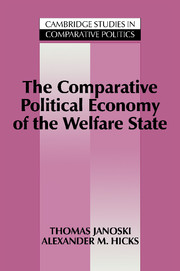Book contents
- Frontmatter
- Contents
- List of contributors
- List of tables and figures
- Preface
- 1 Methodological innovations in comparative political economy: an introduction
- PART I TIME-SERIES ANALYSIS
- PART II POOLED TIME-SERIES AND CROSS-SECTIONAL ANALYSIS
- PART III EVENT HISTORY ANALYSIS
- PART IV BOOLEAN ANALYSIS
- 12 Introduction to qualitative comparative analysis
- 13 A qualitative comparative analysis of pension systems
- 14 The politics of social security: on regressions, qualitative comparisons, and cluster analysis
- 15 Conclusion: quo vadis political economy? Theory and methodology in the comparative analysis of the welfare state
- Author index
- Subject index
15 - Conclusion: quo vadis political economy? Theory and methodology in the comparative analysis of the welfare state
Published online by Cambridge University Press: 05 June 2012
- Frontmatter
- Contents
- List of contributors
- List of tables and figures
- Preface
- 1 Methodological innovations in comparative political economy: an introduction
- PART I TIME-SERIES ANALYSIS
- PART II POOLED TIME-SERIES AND CROSS-SECTIONAL ANALYSIS
- PART III EVENT HISTORY ANALYSIS
- PART IV BOOLEAN ANALYSIS
- 12 Introduction to qualitative comparative analysis
- 13 A qualitative comparative analysis of pension systems
- 14 The politics of social security: on regressions, qualitative comparisons, and cluster analysis
- 15 Conclusion: quo vadis political economy? Theory and methodology in the comparative analysis of the welfare state
- Author index
- Subject index
Summary
Before answering where the political economy of the welfare state may be going in the near future, we should first explain what we mean by that powerful but elusive term – “political economy.” Political economy can encompass a maddeningly wide range of studies. In a book aptly titled What Is Political Economy? Martin Staniland asks what it means to title a work “The political economy of … “ (1985, p. 1). He concludes that ”there is no such thing as ‘the theory of political economy,’ and there never will be, in the sense of a single universally accepted complex of assumptions and methodology” (p. 198). He goes on to say that the use of the term “refers to a continuing intellectual enterprise, a particular agenda, a specific object of theoretical ambition” (p. 198). These diverse ways of viewing political economy range from classical and neoclassical economics through Marxist analysis, sociological studies of economic processes in institutional context, and political science analyses of “politico-economic interactions” (Frey 1979; Caporaso and Levine 1992). We will briefly review each approach and place this volume within the overall context of political economy.
The editorial board of the Library of Political Economy at Oxford University Press lists a somewhat earlier definition from economics:
POLITICAL ECONOMY is the old name for economics. In the hands of the great classical economists, particularly Smith, Ricardo and Marx, economics was the study of the working and development of the economic system in which men and women lived. […]
- Type
- Chapter
- Information
- The Comparative Political Economy of the Welfare State , pp. 365 - 380Publisher: Cambridge University PressPrint publication year: 1994



